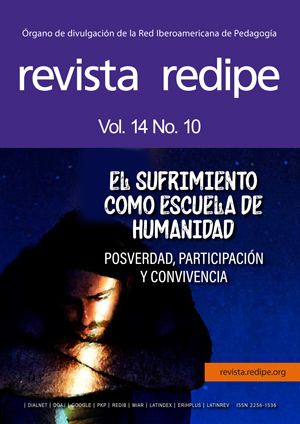Post-truth, school governments, and democratic participation in youth: a systematic review following the prisma 2020 statement
Main Article Content
Keywords
Post-truth, Disinformation, Social media, Communication ethics
Abstract
This systematic review examines the relationship between post-truth, opinion formation, political impact, and democratic participation among young people in primary and secondary educational institutions. It seeks to understand the current debate on the impact of social media on opinion formation and the development of judgments for democratic participation within educational communities, analyzing articles from countries such as Australia, the United States, England, Russia, Latin America, the United Kingdom, Canada, Spain, Korea, and China.
The reviewed studies (22 articles indexed in Scopus, 7 in ERIC, and 1 in Scielo) highlight the importance of training teachers to critically address fake news and post-truth, both considered threats to democracy and education. They examine the incidence of post-truth on democratic participation within educational institutions, provide an overview of post-truth, including its definition and implications for society and education, and emphasize the need to address it through critical training as well as media and technological literacy.
References
Aguerri, Jesús C.; Miró-Llinares, Fernando. «¿Comunicación ofensiva y de odio o desinformación programada?». IDP. Revista de Internet, Derecho y Política, 2023, n.º 37, pp. 1-16, https://doi. org/10.7238/idp.v0i37.397192.
Banks, J. A. (2008). Diversity, Group Identity, and Citizenship Education in a Global Age. Educational Researcher, 37(3), 129–139. doi:10.3102/0013189x08317501.
Bermúdez Vázquez, Manuel (2021). «Posverdad y noticias falsas: esquemas perversos de interferencia democrática». Monograma.
Revista Iberoamericana de Cultura y Pensamiento, n.o 8, pp. 17-38. doi: 0.36008/monograma.2021.08.1422. http: revistamonograma.com. ISSN: 2603-5839.
Buckingham, D. (2019). Teaching media in a ‘post-truth’ age: fake news, media bias and the challenge for media/digital literacy education. Culture and Education, 31 (2), 213-231, Doi: https://doi.org/10.1080/113 56405.2019.1603814.
Bumsoo Kim (2023) A cognitive mechanism for democratic norms: testing a hypothesized model of news literacy, cross-cutting discussion, and elaboration, Asian Journal of Communication, 33:1, 1-19, DOI: 10.1080/01292986.2022.2140814.
Carias Pérez, F., Hernando Gómez, Ángel, & Marín-Gutiérrez, I. (2021). La radio educativa como herramienta de alfabetización mediática en contextos de interculturalidad. Revista De Comunicación, 20(2), 93–112. https://doi. org/10.26441/RC20.2-2021-A5.
Choi, M. (2016). A Concept Analysis of Digital Citizenship for Democratic Citizenship Education in the Internet Age. Theory & Research in Social Education, 44(4), 565–607. doi:10.1080/00933104.2016.1 210549.
Chloe Ashbridge, Matthew Clarke, Beth T. Bell, Helen Sauntson & Emma Walker (2022) Democratic citizenship, critical literacy and educational policy in England: a conceptual paradox?, Cambridge Journal of Education, 52:3, 291-307, DOI: 10.1080/0305764X.2021.1977781.
Charteris, J., & Smardon, D. (2019). Democratic contribution or information for reform? Prevailing and emerging discourses of student voice. Australian Journal of Teacher Education, 44(6).Retrieved from https://ro.ecu.edu.au/ajte/vol44/iss6/1.
De la Garza Montemayor, D.J. (2022). La interacción digital y la transición en el consumo de información de las nuevas generaciones. En: Rocha, Á., Barredo, D., López-López, P.C., Puentes-Rivera, I. (eds) Comunicación y Tecnologías Inteligentes. ICOMTA 2021. Innovación inteligente, sistemas y tecnologías, vol. 259. Springer, Singapur. https://doi. org/10.1007/978-981-16-5792-4_32
Ehrenfeld, D., & Barton, M. (2019). Online Public Spheres in the Era of Fake News: Implications for the Composition Classroom. Computers and Composition, 54.
Elena Aydarova (2020): Jokers’ pursuit of truth: critical policy analysis in the age of spectacle and post-truth politics, Critical Studies in Education, DOI: 10.1080/17508487.2020.1831566.
Estrada-Cuzcano, A., Alfaro-Mendives, K., & Saavedra-Vásquez, V. (2020). Disinformation y misinformation, posverdad y fake News: Precisiones conceptuales, diferencias, similitudes y yuxtaposiciones. Informacion, Cultura y Sociedad, (42), 93-106. https://doi. org/10.34096/ics.i42.7427.
Faramiñán Fernández-Fígares, Juan Manuel de (2021). «Reflexiones jurídicas acerca de la posverdad». Monograma. Revista Iberoamericana de Cultura y Pensamiento, n.o 8, pp. 59-78. doi: 10.36008/monograma.2021.08.1508. http: revistamonograma.com. ISSN: 2603-5839.
Foucault, M. (1999). Estrategias de poder. Obras esenciales Volumen II. Barcelona: Paidós Básica.



